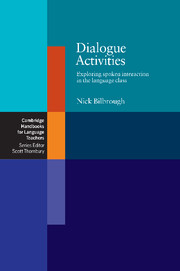Book contents
- Frontmatter
- Contents
- Thanks and acknowledgements
- Introduction
- 1 Understanding
- 2 Analysing
- 3 Reproducing and reconstructing
- 4 Memorising
- 5 Rehearsing and performing
- 6 Co-constructing
- 7 Creating and personalising
- 8 Communicating
- 9 Dialogue as learning
- Dialogue Bank A From the film Mulholland Drive
- Dialogue Bank B Authentic snippets
- Dialogue Bank C Snippets from fairy tales
- Dialogue Bank D Lame jokes
- Dialogue Bank E Situational dialogues
- Dialogue Bank F ‘Dating Agency’ from the comedy series Little Britain
- Further reading and resources
- Index
- Frontmatter
- Contents
- Thanks and acknowledgements
- Introduction
- 1 Understanding
- 2 Analysing
- 3 Reproducing and reconstructing
- 4 Memorising
- 5 Rehearsing and performing
- 6 Co-constructing
- 7 Creating and personalising
- 8 Communicating
- 9 Dialogue as learning
- Dialogue Bank A From the film Mulholland Drive
- Dialogue Bank B Authentic snippets
- Dialogue Bank C Snippets from fairy tales
- Dialogue Bank D Lame jokes
- Dialogue Bank E Situational dialogues
- Dialogue Bank F ‘Dating Agency’ from the comedy series Little Britain
- Further reading and resources
- Index
Summary
Many learners give a higher value to being able to speak in a foreign language than being able to write in it. For this reason, speaking activities have become a prominent feature of many language learning courses. However, in terms of language development, writing has a certain advantage over speaking in that the writer is not normally under pressure to produce language quickly and in real time. Speakers need to maintain a reasonable pace so that they do not lose the attention of the person who is listening, and they therefore have little time available to attend to linguistic form. Writers, on the other hand, secure in the knowledge that their audience is not waiting impatiently for a message to be delivered, tend to be able to allocate more attention to accuracy, by, for example, consulting other learners, the teacher or dictionaries when needed.
The activities in this section focus on spoken language, but take a more analytical and reflective approach than is sometimes offered, asking the learners to plan, structure and perhaps modify the contents of the dialogues they produce. Although the dialogues which are constructed should ideally be meaningful and communicative, the principal aim with these activities is to produce dialogues which activate and contextualise particular areas of language.
This also has implications for the role of correction from the teacher and other learners. Reformulating or correcting learners' utterances whilst they are engaged in meaningful communication can sometimes have a detrimental effect on the communication itself.
- Type
- Chapter
- Information
- Dialogue ActivitiesExploring Spoken Interaction in the Language Class, pp. 134 - 154Publisher: Cambridge University PressPrint publication year: 2007



